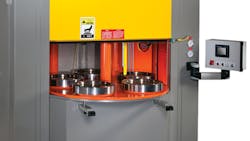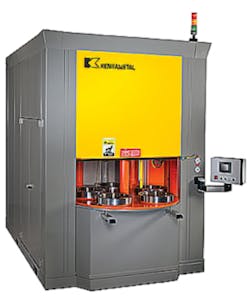“Instantaneous” Surface Finishing for Critical Auto Parts
Successful global manufacturing begins with global standards for product quality. Manufacturers and quality professionals in industrial sectors like automotive, aerospace, energy, medical, and others require that high-precision components conform to those standards: they know that removing particles left at intersected holes, and ensuring no “micro contamination” is a quality challenge that cannot be overlooked. Customized complex valves, gears, pinions, and thousands of other components can be machined in seconds — but it may take minutes to finish a part completely. Production bottlenecks, increased costs, and longer time to market are among the results.
Kennametal Extrude Hone is dedicated to providing precision surface solutions worldwide, for its customer to be able to produce component of uncompromising quality. Proprietary technologies such as TEM (thermal energy machining) are solving increasingly complex finishing challenges that manufacturers around the world must address.
Delphi-TVS, a joint venture of Delphi Corp. and T.V. Sundaram Iyengar & Sons, Kancheepuram, is the largest automotive systems manufacturer in India.
“Being a global company, we have a great responsibility to maintain world-class quality standards in our products,” according to T.N. Umasankar, head of the Delphi-TVS manufacturing engineering department.
“We manufacture diesel fuel injection parts — high-volume components. The main issue is burr removal on cross-sectional holes from previous machining operations.”
Delphi-TVS faced many issues: High component volumes (nearly 1 million finished parts per year) made hand-deburring unaffordable, and the high-precision nature of diesel fuel injectors made some reliable, high-performance solution necessary. After evaluating numerous alternatives, Delphi-TVS chose Kennametal Extrude Hone´s TEM (thermal energy method) technology.
A pressurized mixture of a combustible gas and oxygen is injected at 5 to 10 atmospheres of pressure into a containment chamber sized both by the amount of material to be removed and the volume of parts in the chamber. An ignition system ignites the gas mixture, releasing heat energy from the oxidation of fuel in a 20-millisecond, high-speed energy wave.
With their raised surface areas and thin cross-section features, even internal burrs and flashings burn away instantly. Because the gas mixture engulfs the entire workpiece, all internal and external surfaces are exposed to the rapid oxidation. Internal cross-drilled holes and intersecting edges that are difficult or impossible to reach are processed instantly.
“There have been hundreds of installations and continued refinement of our TEM equipment and process,” explained Bruno Boutantin, global marketing manager at Kennametal Extrude Hone. “One factor remains constant: TEM is a rapid, low-cost, high-production process that can process a million or more parts per year by a single machine.”
“The TEM process is particularly appropriate for high-volume applications where conventional deburring departments struggle to keep pace,” Umasankar agreed. “Instantaneously, it cleans a large number of intersecting holes, threads and hard-to-reach areas, in a flash, literally in 20 milliseconds. Its ability to fire multiple components at the same time increases its capacity and cost-effectiveness enormously. Any other process, including high-pressure water jet, will not provide this value.”
Kennametal Extrude Hone combines more than five decades of manufacturing experiences with global applications know-how to offer proven solutions to companies working in the most demanding environments. Technical centers and “centers of excellence” ensure close customer association in critical projects — from the early design phases by producing small batches of components for prototyping, through supporting the ramping stage in our contract shops prior to the final delivery of state-of-the-art equipment.
Kennametal Extrude Hone is a part of Kennametal India Ltd., with a technical center in Bangalore equipped to support customers in project development and process solutions.
About the Author
Robert Brooks
Content Director
Robert Brooks has been a business-to-business reporter, writer, editor, and columnist for more than 20 years, specializing in the primary metal and basic manufacturing industries.

